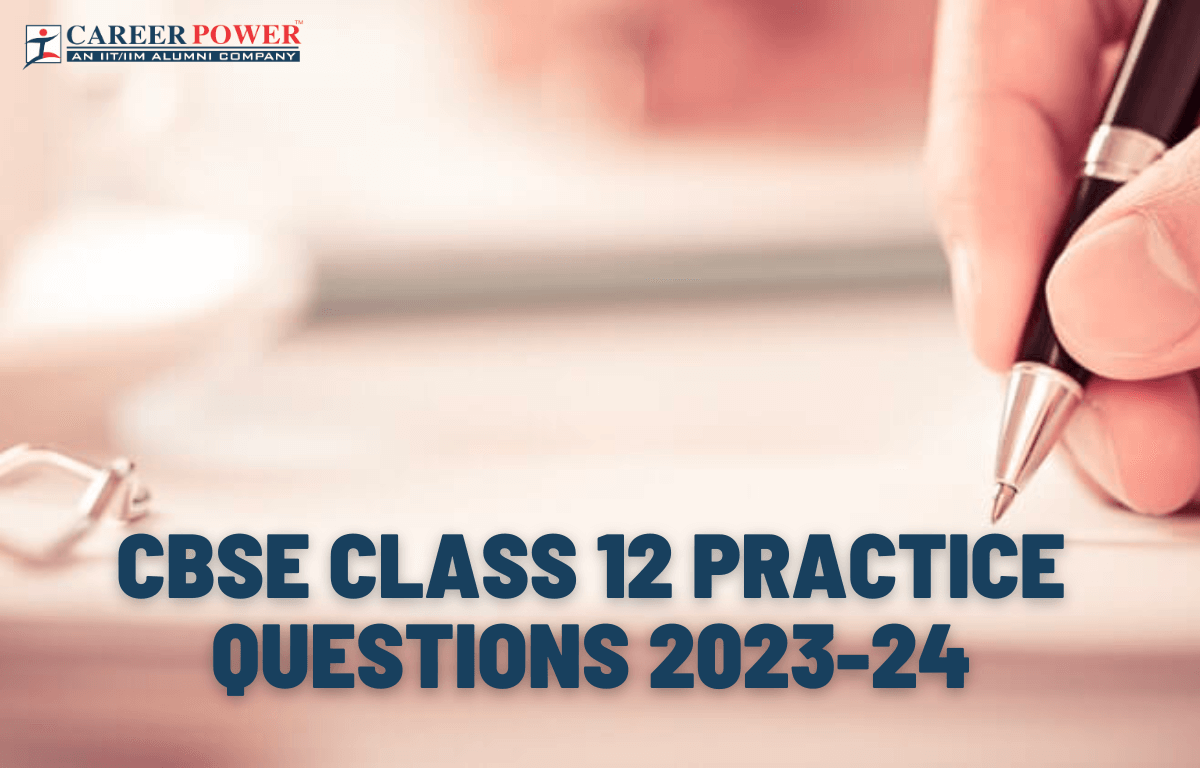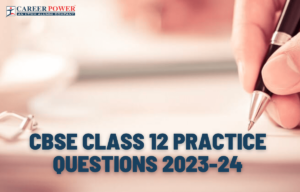Table of Contents
The Central Board of Secondary Education has released the CBSE Class 12 English Additional Practice Paper Questions 2023-24 along with other subjects’ additional practice papers recently on their official website at www.cbseacademic.nic.in. Students of class 12 who are going to confront their board exams in a matter of few months can download this CBSE English Additional Practice Paper Questions 2023-24 Class 12 and prepare for their board exams well. Students should give equal importance and concentrate on the core English language same as their core subjects to score well and to increase their total percentage and overall grade.
Class 12 English Additional Practice Paper Questions 2023-24 (CBSE)
The Question Paper of class 12 English Subject contains three sections- Reading, Writing and Grammar and Literature with 80 marks in total. Below is the discussed pattern & marking scheme released through CBSE Class 12 English Sample Paper (English Language & Literature) which is set as per the latest exam pattern to be followed in the actual exam.
| CBSE Class 12 English Additional Practise Paper Questions 2023-24 Format | ||
| Sections | Section Name | Total Marks under each section |
| Section A | Reading Skills | 22 |
| Section B | Creative writing skills | 18 |
| Section C | Literature textbook and supplementary reading text | 40 |
English Sample Paper Class 12 2023-24 PDF with Solution
The students who are going to appear in the 12th Board English exam which has been scheduled in the month of February 2023-24, must have last-minute preparation with English Sample Paper Class 12 released by CBSE. The Class 12 English sample paper has been set as per the CBSE Class 12 Syllabus & new exam pattern. For your ease, we have provided the direct link to download the CBSE Class 12 English Sample Paper PDF along with the solution and marking scheme which was uploaded to https://cbseacademic.nic.in/.
| CBSE Class 12 English Additional Practise Paper Questions 2023-24 PDF Download | |
| Additional Practise Paper | Solution PDF |
| CBSE Class 12 English Additional Practise Paper Questions 2023-24 | Solution Link |
CBSE Class 12 English Additional Practice Paper Questions 2023-24
CBSE Board has released the CBSE English Additional Practice Paper 2023-24 Class 12 along with the marking scheme for the academic session 2023-2024 at the official website www.cbseacadmic.nic.in. Students can start practising the sample papers and refer to the solutions a number of times to score well on their exams.
Section A: READING SKILLS (22 marks)
Q1. Read the following text
(1)Apollo, the Greek god of music and healing, always maintained that he was the greatest musician in the world, until Marsyas, who was part animal and part human, played the flute. Apollo’s jealousy and insecurity drove him to eventually slay Marsyas so that his status as the greatest musician remained unchallenged. One’s usual imagination of a god is a being who is all-knowing and pure in every intention. What makes the Greek gods
interesting is that they are shown as flawed beings who do not always act like ‘Gods’.
(2)In appearance, the gods resemble mortals, whom, however, they far surpass in beauty, grandeur, and strength; they are also more commanding in stature, height being considered by the Greeks an attractive feature in men or women. They resemble human beings in their feelings and habits, marrying and having children with them. They require daily nourishment to maintain their strength, and sleep to restore their energy. Their blood, a bright magical fluid called Ichor, never causes disease, and, when shed, produces new life.
(3)The Greeks believed that the mental qualifications of their gods were much higher than those of men, but, nevertheless, displayed human passions like revenge, deceit, and jealousy. In mythological tales, the gods always punish the evil-doer and administer dire punishments to any mortal who dares to neglect their worship. They often visit mankind and partake of their hospitality, and in many tales, both gods and goddesses become
attached to mortals. Although there were so many points of resemblance between gods and men, there remained the one great characteristic distinction: immortality. Still, the gods were not invulnerable and were often wounded and suffered so much that they’d pray for death. The gods could transport themselves to incredible distances with the speed of thought.
(4)They could be invisible at will, and could take the forms of men or animals as it suited their convenience. They could also transform human beings into trees, stones, or animals. Their robes were like those worn by mortals, but were perfect in form and much finer in texture. Their weapons also resembled those used by mankind. They often used spears, shields, helmets, bows and arrows. Most of these divinities lived on the summit of Mount Olympus, each having his or her own palace. Magnificent temples were erected to their honour, rich gifts were presented to them, and living creatures were sacrificed on their altars.
(5)In Greek mythology, the gods take every opportunity to reveal and establish their divinity but also fall prey to human impulses. Perhaps the Greeks did so to help generations of readers reflect on important life lessons to avoid tragic downfalls.
– E. M. Berens
Answer the following questions based on the passage above.
‘… they are shown as flawed beings who do not always act like ‘Gods’.
(paragraph 1)
1. Which of these are examples of the above statement?
I. God getting attached and falling in love
II. Gods punishing mortals for their wrongdoing
III. Gods showing kindness and compassion to all
IV. Gods deceiving everyone for their personal gain
V. Gods killing a mortal out of jealousy and insecurity
Select the correct option.
A. Only I and III
B. Only II and V
C. Only I, IV, and V
D. Only II, IV, and V
Ans. C. Only I, IV, and V
2. Which of these would Apollo most likely say about Marsyas’ musical ability?
A. ‘Why does everyone think he plays music well? It is obvious that he doesn’t have talent.’
B. ‘Why is he challenging me like that? I wonder what is troubling him that I can heal.’
C. ‘How can an animal play the flute? Such creatures must know their place.’
D. ‘How dare he play better than me? I am supposed to be the best in the
world.’
Ans. ‘How dare he play better than me? I am supposed to be the best in the world.’
3. Why does the author begin the passage with a description of Apollo?
A. to show that the Greek Gods have immense power and influence over the mortals
B. to emphasise the point that the Greek Gods are based on interesting stories
C. to highlight the point that the Greek Gods are more human-like in nature
D. to state that the Greek Gods are also allowed to make mistakes
Ans. C. to highlight the point that the Greek Gods are more human-like in nature.
4. What is ironic about Apollo being the one who slays Marsyas? Answer in about 40 words.
Ans.
- It is ironic as he is the god of ‘healing’ and he brought about destruction;
- The god of healing acted on an impulse that shows that he himself needed healing;
- The behaviour of the god is unexpected as he is supposed to show behaviours that would ‘heal’ mortals.
5. Based on your reading of paragraph 3, explain what ‘invulnerable’ means. Answer in one sentence.
Ans.
- It means to be immune.
- It means to be protected against harm or damage.
- It means to be safe.
- It means to be indestructible.
- It means to not be vulnerable
6. In 40 words, state any two ways that the Greek gods are superior to human beings.
Ans.
- they are more beautiful and grand
- they are stronger and taller
- they have magical blood, Ichor
- they are more intelligent
- they are immortal
- they can transport themselves anywhere with a thought
- can be invisible at will or take any form they desire
- wear robes of finer texture
- have temples erected to them,
- have creatures sacrificed in their name
- they were given rich gifts
7. Complete the given sentence with ONE word.
From the fact that the Greek gods punish any mortal who neglects their worship, we can infer that they are _____________.
Ans.
- vengeful/revengeful
- egotistical/egoistic
- conceited
8. Imagine that someone was born from Ichor. In which of these situations would the Ichor be most useful?
A. a natural disaster that causes the earth to split apart
B. a pandemic that has been caused by a contagious virus
C. a war that requires transforming into another form quickly
D. a competitive entrance exam that is very tough to qualify for
Ans. B. a pandemic that has been caused by a contagious virus
9. What does the author mean by ‘tragic downfalls’ in paragraph 5? Give an example of a tragic downfall in current times in about 40 words.
Ans.
Explanation:
- He is referring to the ugly consequences of our actions when we act based on an impulse or out of jealousy, insecurity, etc.
- He is referring to those actions that we do to others with the intention of causing harm, destruction, or taking revenge.
- These are those situations that we may regret but have no way of reversing as they have dire consequences.
- It means starting from a place where we are put on a pedestal and falling to a level where we are looked down upon.
Example:
- A person breaks a friendship between two people because they feel jealous of how close the friends are. The person is shunned, as a result.
- One commits a serious crime, like theft or destruction, because one wants to take revenge on someone. One may go to jail, as a result.
- We agree to cause harm to someone else because a loved one asks this of us. As a result, we destroy someone’s life who did no harm to us.
SECTION B : CREATIVE WRITING SKILLS (18 marks)
Attempt ANY ONE of two in about 50 words.
A. Maruti Public School will be conducting an online course on news reading during the summer vacations for students of Class XI and XII. In this course, students will learn to understand news reports, build the habit of reading the news regularly, and will have a chance to interact with well-known journalists.
As Rutwik Sen, Editor of the school magazine, draft a notice in about 50 words for the school notice board, urging students to sign up. Mention any other relevant details required for the notice.
OR
B. The Teen Well-Being Association of your society, EcoTech World, Sector 13, Chandigarh, will be holding free yoga classes on Sunday mornings, in the common hall. As a member of the association, draft notice in about 50 words informing the young residents. Mention any other relevant details required for the notice.
Name of Organisation
(centre aligned)
NOTICE
(centre aligned)
Date
Heading
(centre aligned)
[details]
(centre aligned)
Signature
Name (issuing authority)
Designation
Ans.
A. Correct format (as listed)
- Draws attention — students of XI & XII
- Mentions the event
- Gives details — date, time, venue
- Invites applications
- Adds line with reference to the undersigned
B.Correct format (as listed)
- Draws attention — residents aged 12–18 years
- Mentions the event
- Gives details — date, time, venue
- Invites people to attend
- Adds line with reference to the undersigned
SECTION C : LITERATURE TEXTBOOK AND SUPPLEMENTARY READING TEXT (40 marks)
Read the given extracts and answer the questions for any one of the two, given.
The man ceased his mutterings, and then a third bell was tapped. Everyone picked up his knife and fork and began eating. I began crying instead, for by this time I was afraid to venture anything more. But this eating by a formula was not the hardest trial on that first day. Late in the morning, my friend Judewin gave me a terrible warning. Judewin knew a few words of English; and she had overheard the paleface woman talk about cutting our long, heavy hair. Our mothers had taught us that only unskilled warriors who were captured had their hair
shingled by the enemy. Among our people, short hair was worn by mourners, and shingled hair by cowards!
(Memories of Childhood: The Cutting of my Long Hair)
i. Which of these can be inferred from the extract?
A. The speaker did not understand or speak English.
B. The speaker did not think highly of her own culture.
C. The speaker did not have any living family members.
D. The speaker did not know what a knife or fork were used for.
Ans. A. The speaker did not understand or speak English.
ii How was the speaker feeling by the time the third bell rang? Why did she feel this way?
- The speaker started crying because she felt confused and out-ofplace.
- She couldn’t understand the rituals and was probably feeling
embarrassed. - She was too scared to act because she was not able to do anything
correctly.
iii Complete the given sentence appropriately. The speaker compares her experience of eating to that of a trial because
__________.
Ans.
- she was being watched and judged throughout
- it felt like a test of her survival
- it was as gruelling as a trial in court might have been
iv Based on the extract, what would it mean to the speaker if her long hair was cut?
Ans.
- It would mean a loss of her culture/cultural identity
- It would bring her shame
- It would cut her roots to her culture and traditions


 CBSE Class 12 Business Studies Sample Qu...
CBSE Class 12 Business Studies Sample Qu...
 CBSE Class 12 Chemistry Practice Questio...
CBSE Class 12 Chemistry Practice Questio...